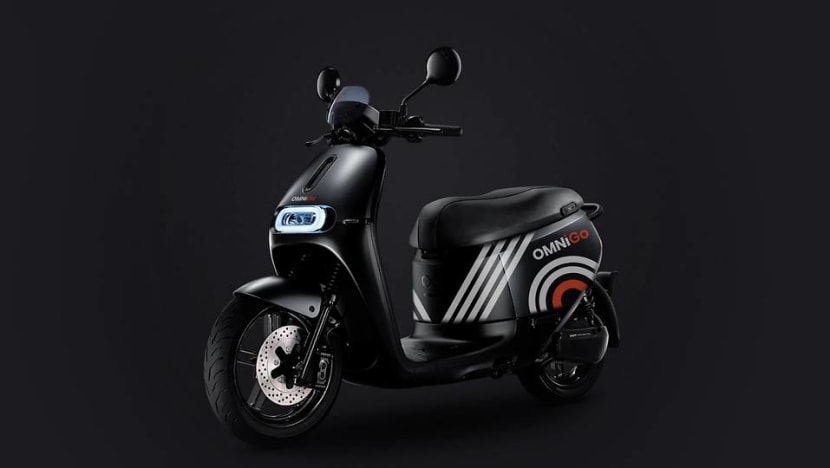Costa Rican firm OMNi aims to bring electric motorcycle-sharing service to Singapore

Artist's impression of an OMNiGo electric motorcycle, part of a collaboration between Costa Rican firm OMNi and Taiwanese electric motorcycle maker Gogoro. (Photo: OMNi)
SINGAPORE: A year ago, OMNi was one of 12 firms vying to operate shared services for personal mobility devices (PMD) under a Land Transport Authority (LTA) scheme.
Those plans came to a halt, however, when the scheme were scrapped, in line with Singapore's ban on the use of e-scooters and other PMDs on footpaths.
Now, the Costa Rican firm intends to make a comeback here – but with electric motorcycles.
It has tied up with Taiwanese electric motorcycle manufacturer Gogoro to bring the vehicles to Singapore, said OMNi’s Asia-Pacific chief executive Erik Cheong, adding that they would be rented out like the shared electric cars offered by BlueSG.
He told CNA that he expects to have 2,000 motorcycles available in Singapore within the next three years, which members of the public will be able to rent as a first-and-last mile mode of transport via the OMNi app.
“We have the expertise in mobility so we will be creating our own software,” Mr Cheong said, adding that OMNi is in discussions with the authorities.
This comes after it was announced earlier this year that high-powered electric motorcycles, referring to those with power ratings of more than than 10kW, would be allowed on the roads here, with those able to hit at least 50kmh now allowed on expressways.
If it is given approval, OMNi would be the second motorcycle-sharing operator in Singapore. Car-sharing firm Tribecar had in 2018 launched an hourly-rated service offering shared conventional motorbikes.
READ: High-powered electric motorcycles to be allowed on Singapore roads from April
The motorcycles, named OMNiGo, will not have to be plugged into dedicated stations to recharge. Instead, users will be able to swap out their batteries for new ones when they are running low.
“So how it works is you just have to open up the seats, and then you can plug in two batteries and start travelling,” said Mr Cheong, who previously co-founded local logistics startup Park N Parcel.
This would cut the amount of time spent charging in parking lots, he said.
Noting fire safety concerns from overheating and charging batteries in one spot, Mr Cheong said that Gogoro has not come across such incidents since the launch of its GoShare service in Taiwan last year.
For a start, OMNi aims to market its motorcycles to businesses.
The plan is to have four electric motorcycles as part of a “sandbox” trial in Singapore by next year, and it is currently in discussions with logistics and food delivery companies, as well as government agencies, to start rolling out its vehicles on the roads.
Mr Cheong said the OMNiGo electric motorbikes will attract companies wanting to become more eco-friendly, and a plus point is that they will be leased at the same price as conventional motorcycles.
READ: Electric motorcycles made and designed in Singapore set to rev up Southeast Asia
Despite getting burned once in Singapore after its shared-PMD service plans got shelved, OMNi is optimistic about its new venture.
This is because unlike PMDs, OMNiGo will require users to have a valid motorcycle licence, Mr Cheong said.
The motorcycles will also have to be parked in designated parking lots, avoiding the parking issues that plagued bicycle- and PMD-sharing services.
Singapore University of Social Sciences urban transport expert Park Byung Joon however said he is sceptical about OMNi's chances.
Traditionally, the main market for vehicle rental firms involves people who use them for work purposes, such as business travellers, he said.
These meant such firms were able to price their services high enough in order for them to recoup their expenses, while so-called sharing economy companies have had to price their services low to attract entice customers, he added.
"No 'sharing economy business' has shown financial viability so far," said Associate Professor Park. "I doubt it will make money."
SUPERAPP AMBITIONS
OMNi first made headlines in early-2019 after it was reported that co-founder Oscar Moises Chaves had bought a majority stake in beleaguered bicycle-sharing firm oBike.
When oBike abruptly stopped operations in 2018, more than 200,000 users were affected, with S$8.9 million in as-yet unrefunded deposits.
Mr Chaves had told the media last year that he intended to clear oBike's debts and launch a new range of shared PMDs under the oBike brand.
He later changed his plans, saying he wanted to shut down oBike and move forward under the OMNi name.
While Mr Chaves continues to hold a majority stake in oBike through his investment firm OSS Investment Group, Mr Cheong - who is a partner in OSS - said there has been little progress in settling oBike’s affairs, as its founder and former chairman Shi Yi cannot be found.
In Central America, OMNi has taken the “super-app” approach - offering services ranging from taxi-hailing, e-bike sharing and electronic payments through a single mobile application.
While Mr Cheong did not rule out OMNi expanding its services in Singapore and the rest of Southeast Asia, he said it does not want to compete head-to-head with more established players such as Grab and Gojek.
According to OSS Investment Group on its website, Grab is a "technological and operational" partner of OMNi, although Mr Cheong stresses the ride-hailing giant is not an investor in the Costa Rican firm.
READ: Commentary: With Grab’s super app ambitions, who will it eat for lunch?
For now, OMNi will focus on fundraising as well as research and development, although it ultimately has bigger plans in sight, he said.
Mr Cheong noted that the founders had initially reached out to him by sharing their vision of building the next Alibaba - the Chinese tech giant worth more than US$500 billion - within the next five to 10 years.
“That’s something that I'm inspired to build as well.”















